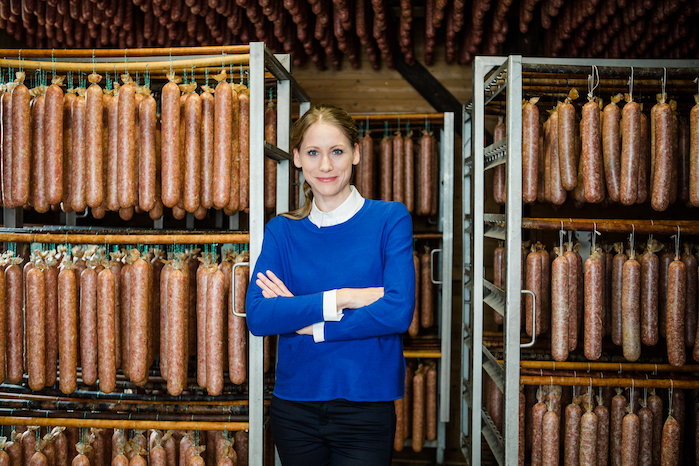Man and machine in the butcher shop

Artificial intelligence is found in the assistance systems of modern vehicles, the popular photo app on smartphones and in many video games. As in other industrial and craft sectors, the use of “AI” is currently being hotly debated in the meat industry. Are old reservations still justified? Or are new technologies opening up previously unimagined possibilities that could offer solutions to burning problems such as the shortage of skilled workers? These and many other questions will be addressed at the Stuttgart SÜFFA, the trade fair for the meat industry (September 28-30, 2024), which has always seen itself not just as a marketplace and showcase, but as an important trading center for new trends, developments and ideas - to paraphrase the slogan “100 percent innovative”.
So much in advance: There is no need to fear a robot invasion. “The fact that butchers and shop staff will be displaced by machines in the near future is of course science fiction,” reassures project manager Sophie Stähle from Messe Stuttgart. “The boundaries between craftsmanship, computer-aided automation and artificial intelligence are already fluid today. You can experience the opportunities and possibilities of intelligent digital solutions at SÜFFA.”
Saves time and resources: AI in the food sector
AI is already busy at work in many parts of the food sector, especially in agriculture. Numerous processes can be optimized along the entire value chain. The traditionally artisanal meat industry still occasionally finds it difficult to cope with this development. But the digital revolution is now also finding its way into sausage kitchens and cutting plants. The areas of application of artificial intelligence are diverse, for example in automatically determining meat quality and determining downstream processing - or in walk-in 24/7 vending machines that keep an eye on their own product range and automatically place repeat orders. AI increases efficiency and, last but not least, reduces personnel costs - keyword shortage of skilled workers.
Optimal ripeness: AI monitors the sausage
The “Ahle Wurst meets Artificial Intelligence” project at the University of Kassel shows what successful collaboration between humans and machines can look like in a family-run butcher shop: Together with the Caldener Landfleischerei Koch, a process was developed in which an AI optimizes the ripening process of the North Hessian specialty . Information about room temperature, humidity or the PH value of the sausages is collected using a sensor and transmitted to a central computer. A program calculates the necessary next steps. Based on these specifications, staff can intervene in the maturation process accordingly. Any feedback is then fed into the system and processed immediately: the AI learns.
“The project was designed as a one-year feasibility study and should be transferable to other craft areas,” explains master butcher Katharina Koch, who is the fifth generation to run her parents’ business. In addition to purely technical or result-oriented aspects, the cost-benefit calculations carried out as part of the project are also quite promising: “Our partners from the university draw a very positive conclusion. It is worth it!"
Tradition and future: “People are irreplaceable”
However, there is still a need for explanation to customers, but also among colleagues, reports Koch. “Some people think it's great that a craft business does something like this, others are skeptical and ask whether it's still a craft. But tradition doesn’t mean that you don’t do anything new, otherwise we would still be working like in the Stone Age.” The fear, often fueled by the media, that AI could cost jobs is completely unfounded: “In our industry, the problem is the opposite; there are too few skilled workers. Humans cannot be replaced, but AI can support them in time-consuming routine tasks.”
Direct contact from person to person is also what ultimately defines a trade fair like the Stuttgart SÜFFA, says Katharina Koch. “SÜFFA is very important for exchange within our industry. Away from ongoing operations, you have time to deal with new things. The trade fair is tailored to the craft sector and is therefore the most popular event of its kind!”
About SÜFFA
People and markets come together at SÜFFA in Stuttgart. It is the industry meeting point for the butcher trade and medium-sized industries nationally – and in neighboring countries. In the halls, exhibiting companies from the areas of production, sales and shop equipment present themselves to a competent specialist audience. The SÜFFA specials also make the trade fair an event that no specialist company can miss.
